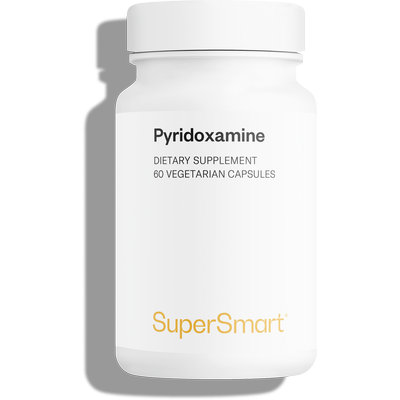The 5 most effective vitamins against fatigue
Feeling tired? Certain vitamins play a vital role in energy production and can help you stay in shape every day. Let's take a look at the 5 most effective vitamins against fatigue.

Vitamins play an essential role in energy metabolism
The proper functioning of energy metabolism is largely based on the action of vitamins and minerals in the body.
These micronutrients take part in numerous biochemical reactions involved in energy production.
In particular, vitamins are involved in converting the carbohydrates, fats and proteins we consume into energy that can be used by our cells (1).
An adequate intake of vitamins therefore helps to prevent dietary deficiencies and provides effective support for physiological functions, so that we maintain a good level of energy throughout the day.
That's why a course of vitamins to combat fatigue can be so beneficial.
Each vitamin has its own mechanism of action, offering benefits that vary from one to another.
Some, however, are better at reducing the feeling of tiredness and improving overall vitality, particularly during periods of stress, overwork or convalescence.
List of the 5 vitamins effective against fatigue
Vitamin B12: an essential ally against fatigue
Essential for the body to function properly, vitamin B12 helps to reduce fatigue. It contributes to normal energy metabolism by playing a part in the energy production processes that cells use on a daily basis (2).
What's more, its involvement in the normal functioning of the nervous system and in maintaining normal psychological functions makes it a valuable support during periods of stress or low morale (3).
Vitamin B12 also contributes to the normal formation of red blood cells, which are essential for transporting oxygen around the body, particularly to the muscles, and can therefore have an impact on feelings of physical fatigue.
Finally, it plays a part in the normal functioning of the immune system. This is essential for fighting viral and bacterial infections, which are major sources of fatigue.
As bioavailable vitamin B12 is mainly found in foods of animal origin, it is very important to ensure that you are getting enough if you eat little or no meat.
In all cases, a dietary supplement containing this vitamin is ideal for enriching your diet (like our Methylcobalamin supplement).
Vitamin B9 (folic acid): invaluable daily support
Vitamin B9, or folic acid, is naturally present in various foods, where it's referred to as folate and is known to contribute to reducing fatigue.
Folates contribute to the normal metabolism of homocysteine. When this process functions properly, it helps prevent an excess of homocysteine in the blood, which has been linked to fatigue and cognitive problems (4).
Folates are also involved in the normal formation of blood. Since red blood cells are essential for the proper oxygenation of tissues, they can affect feelings of vitality and physical performance.
Folates also help maintain normal psychological functions. In particular, they are involved in the synthesis of certain neurotransmitters (such as serotonin and dopamine) (5), which influence motivation and resistance to stress.
To increase your intake of vitamin B9, it may be a good idea to turn to a dietary supplement that contains it in a form that can be rapidly used by the body (such as our SuperFolate supplement, with its immediate bioavailability).
Vitamin C: an energising superstar that needs no introduction
Vitamin C is a popular choice when it comes to natural boosters, as it helps reduce tiredness and supports daily well-being.
It plays an important role in maintaining normal energy metabolism, particularly by increasing the absorption of iron (6), an essential mineral found in food. Iron is necessary for the formation of red blood cells, which are responsible for transporting oxygen to the body’s cells.
Vitamin C also contributes to the normal functioning of the immune system. An active immune system makes it easier to resist infections, which are often associated with a drop in energy.
Finally, vitamin C helps to protect cells against oxidative stress, a phenomenon that impairs their efficiency. By protecting them from its harmful effects, its antioxidant properties help to maintain their proper functioning and vitality.
Certain forms of vitamin C are more effective than others in ensuring that supplementation achieves its goal. Liposomal vitamin C, for example, is formulated for maximum absorption by the body (see Liposomal Vitamin C).
Certain forms can also be complementary (which is why we have combined 3 synergistic forms of vitamin C in our Triple C formula).
Finally, some forms are more stable and powerful than others (such as the phosphorylated ascorbate in our Asc2p Vitamin C supplement).
Vitamin B6: another B-group vitamin to stop fatigue
Vitamin B6 plays a central role in energy metabolism and helps reduce fatigue.
It is also essential for the normal functioning of the nervous system. It is involved in the synthesis of neurotransmitters that help regulate mood, sleep and motivation (7). These are all factors that influence perceived daily energy levels.
At the same time, vitamin B6 contributes to the normal functioning of the immune system, the normal metabolism of homocysteine and the normal formation of red blood cells, the importance of which we have already mentioned.
Finally, vitamin B6 helps maintain normal psychological functions, making it a valuable ally in times of stress, anxiety or temporary depression.
To take advantage of the benefits of vitamin B6 supplementation, it is important to choose a natural form that is easy to assimilate (such as the pyridoxamine in our Pyridoxamine Vitamin B6 supplement).
Vitamin D: essential for energy and immunity
Vitamin D also contributes to the normal functioning of the immune system (8).
This is particularly important in the fight against winter infections, when the body synthesises less vitamin D because the skin is less exposed to the sun.
Vitamin D is also involved in the process of cell division. It therefore supports cell renewal, including that of the nervous system, which plays a role in our perception of fatigue.
Although it is not directly involved in energy production like certain B vitamins, various studies have shown that insufficient levels of vitamin D are correlated with chronic fatigue and a drop in energy levels (9).
This is why supplementation is particularly recommended for people prone to seasonal fatigue or living in areas with little sunshine (for example, by taking our Vitamin D3 2000 IU Spray supplement).
SUPERSMART ADVICE
References
- Tardy AL, Pouteau E, Marquez D, Yilmaz C, Scholey A. Vitamins and Minerals for Energy, Fatigue and Cognition: A Narrative Review of the Biochemical and Clinical Evidence. 2020 Jan 16;12(1):228. doi: 10.3390/nu12010228. PMID: 31963141; PMCID: PMC7019700.
- O'Leary F, Samman S. Vitamin B12 in health and disease. 2010 Mar;2(3):299-316. doi: 10.3390/nu2030299. Epub 2010 Mar 5. PMID: 22254022; PMCID: PMC3257642.
- Sahu P, Thippeswamy H, Chaturvedi SK. Neuropsychiatric manifestations in vitamin B12 deficiency. Vitam Horm. 2022;119:457-470. doi: 10.1016/bs.vh.2022.01.001. Epub 2022 Mar 3. PMID: 35337631.
- Veeranki S, Winchester LJ, Tyagi SC. Hyperhomocysteinemia associated skeletal muscle weakness involves mitochondrial dysfunction and epigenetic modifications. Biochim Biophys Acta. 2015 May;1852(5):732-41. doi: 10.1016/j.bbadis.2015.01.008. Epub 2015 Jan 20. PMID: 25615794; PMCID: PMC4372482.
- Miller AL. The methylation, neurotransmitter, and antioxidant connections between folate and depression. Altern Med Rev. 2008 Sep;13(3):216-26. PMID: 18950248.
- Lane DJ, Richardson DR. The active role of vitamin C in mammalian iron metabolism: much more than just enhanced iron absorption! Free Radic Biol Med. 2014 Oct;75:69-83. doi: 10.1016/j.freeradbiomed.2014.07.007. Epub 2014 Jul 15. PMID: 25048971.
- Stover PJ, Field MS. Vitamin B-6. Adv Nutr. 2015 Jan 15;6(1):132-3. doi: 10.3945/an.113.005207. PMID: 25593152; PMCID: PMC4288272.
- Aranow C. Vitamin D and the immune system. J Investig Med. 2011 Aug;59(6):881-6. doi: 10.2310/JIM.0b013e31821b8755. PMID: 21527855; PMCID: PMC3166406.
- Roy S, Sherman A, Monari-Sparks MJ, Schweiker O, Hunter K. Correction of Low Vitamin D Improves Fatigue: Effect of Correction of Low Vitamin D in Fatigue Study (EViDiF Study). N Am J Med Sci. 2014 Aug;6(8):396-402. doi: 10.4103/1947-2714.139291. PMID: 25210673; PMCID: PMC4158648.
2 Days
very good expereince
very good expereince
Jelena Đaković
2 Days
Very good products.
Very good products.
Agnes BENDSAK
4 Days
Just OK
Just OK, ordering from company for many years and being safisfied
Lynn Mae
5 Days
Recomendo
Produtos encomendados são recebidos atempadamente e de acordo com o anunciado! Muito satisfeita!
Carla Sofia
5 Days
Everything is great!
Everything is great!
Jonas
10 Days
The delivery was fast and the product…
The delivery was fast and the product is great
SOMMARIVA Gianni
11 Days
Great service and lots of information
Great service and lots of information
Gabi
14 Days
Service Satisfaction
I’m satisfied with the service; it fulfilled what it set out to do.
Anfhony Abreu
17 Days
Original product and fast delivery
Original product and fast delivery. I haven't started it yet, but will do soon.
Vincenza Catania
20 Days
Good quality
Good quality. Good service.
Leonel Guzman
22 Days
Top!!!!!!!!
Top!!!!!!!!
Michael
24 Days
Excellent!
Products are great and delivered fast!
PARDINI Debora
25 Days
From order to receive the product
From order to receive the product, the process is smooth & fast. It’s good to customers.
WONG Mei Ling
26 Days
Fast delivery
very quick delivery to italy. product is good.
Customer
27 Days
Prompt delivry !!👍
Prompt delivry !!👍
SWEET Christine
of experience
your money back
##montant## purchase






